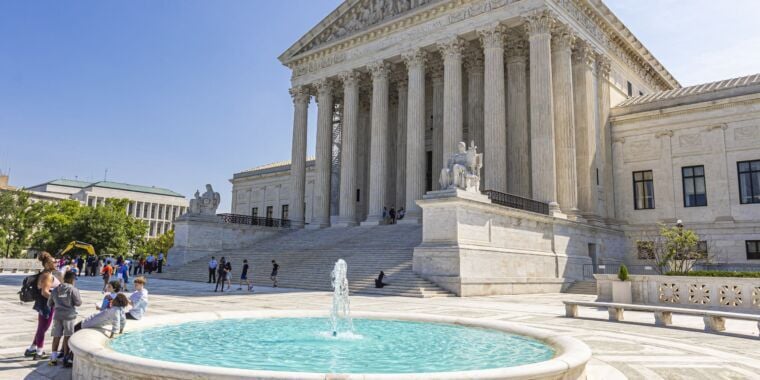- cross-posted to:
- [email protected]
- [email protected]
- cross-posted to:
- [email protected]
- [email protected]
Four more large Internet service providers told the US Supreme Court this week that ISPs shouldn’t be forced to aggressively police copyright infringement on broadband networks.
While the ISPs worry about financial liability from lawsuits filed by major record labels and other copyright holders, they also argue that mass terminations of Internet users accused of piracy “would harm innocent people by depriving households, schools, hospitals, and businesses of Internet access.” The legal question presented by the case “is exceptionally important to the future of the Internet,” they wrote in a brief filed with the Supreme Court on Monday.



I think they’re trying to apply the same logic that’s applied to internet platforms like YouTube, Twitter, etc., where the platform is only non-liable for copyright violations on their platform if they have a good-faith system in place for preventing copyright infringement and responding to DMCA requests. I don’t think this logic should apply to ISPs, frankly the entire internet is far too large of a place to be monitored by any one company for copyright infringement, and I’d rather ISPs be nationalized and treated as public utilities than try to fit them into the same legal framework as social media companies.
That being said, even if the courts decide they should be forced into that same legal framework, ISPs could easily satisfy their legal obligations by simply blocking access to copyrighted content via their DNS service (which can easily be worked around by using an alternative DNS). There’s no legal reason why ISPs would be expected to block individual users from their network, and even if there were, ISPs shouldn’t be allowed to exist anyway, the state (and therefore the people) paid the lion’s-share of the cost to lay all that fiber-optic and copper cable across the country, so the state should own that infrastructure and operate it in the interest of the people (Internet access would be considered a human right and publicly owned ISPs would only have prices high enough to break even, not generate a profit).
A private business should remain private. If the government an take a business away because of public importance, then there is no incentive for a business to grow.
China, North Korea. They siezed businesses, including internet.
I think that’s the only point we disagree on.
I do think ISPs should have much more competition. Exponentially more.
That would be a fair point if we were talking about like, small businesses in markets that are well-suited to competition, but that is not mpdern ISPs.
Iirc, much of the backbone of the US’s fiber optic cable network is publicly owned anyway, it’s just the “last mile” that’s privately owned, which is the local lengths of fiber that run through neighborhoods to individual residences. But most of this infrastructure was also heavily subsidized by the state, so the way I see it, ISPs are essentially leaches that extract rent from a system paid for by the people and (directly or indirectly) built by the state. Why should we let them collect profit from a network they didn’t build when we could own the entire network publicly and set monthly rates to break even, rather than generate a profit (which would keep prices very low, as seen in Every Other Country with mainly state/municipally owned ISPs).
If you allow the government to take over any private business, for any reason, they will fabricate reasons to do so. Stalin, and Mao did this. Publicly owned means owned by the people.